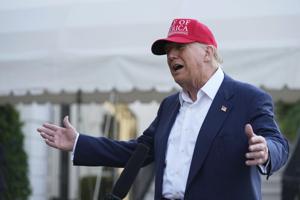Senate Republicans are on the verge of passing President Donald Trump’s significant tax cuts and spending bill following an exhaustive 24-hour voting session. Senate Majority Leader John Thune expressed confidence that they have secured the necessary votes, although some Republicans remain uncertain about the bill’s implications.
The announcement comes as the Senate grapples with intense negotiations and last-minute amendments aimed at securing a majority. Vice President JD has been actively involved, ready to cast a tie-breaking vote if necessary. This legislative push marks a critical moment for the Trump administration, which has prioritized tax reform as a cornerstone of its economic agenda.
Key Provisions of the Bill
The proposed legislation includes sweeping tax cuts intended to stimulate economic growth. Key components involve reducing the corporate tax rate from 35% to 20%, a move hailed by business leaders but criticized by some economists who warn it could significantly increase the national deficit.
Additionally, the bill proposes changes to individual tax brackets, aiming to simplify the tax code and provide relief to middle-income families. However, critics argue that the benefits disproportionately favor the wealthy, raising concerns about income inequality.
Political Dynamics and Challenges
This development follows weeks of intense debate and political maneuvering. Some moderate Republicans have expressed reservations about the bill’s long-term fiscal impact, while others are concerned about the potential elimination of state and local tax deductions, which could adversely affect taxpayers in high-tax states.
According to sources within the Senate, negotiations have been fraught with tension, as leaders strive to balance competing interests and secure the necessary support. The bill’s passage is crucial for the Republican Party, which is eager to deliver on its legislative promises ahead of the midterm elections.
Expert Opinions and Economic Implications
Economists are divided on the bill’s potential impact. Proponents argue that the tax cuts will spur investment and job creation, ultimately boosting the economy. However, opponents caution that the resulting increase in the deficit could lead to higher interest rates and reduced public spending in the future.
“The proposed tax cuts are a gamble that could pay off in terms of economic growth, but they also pose significant risks if not accompanied by corresponding spending cuts,” said Dr. Emily Carter, a professor of economics at Harvard University.
Meanwhile, historical parallels are being drawn to the Reagan-era tax cuts of the 1980s, which similarly aimed to stimulate growth through supply-side economics. While those policies did lead to economic expansion, they also contributed to a substantial increase in the national debt.
Looking Ahead: Potential Outcomes and Consequences
The move represents a pivotal moment for the Trump administration and the Republican Party. Successful passage of the bill would mark a major legislative achievement, potentially bolstering the party’s standing with voters. However, failure to pass the bill could exacerbate internal divisions and weaken the party’s position ahead of the midterms.
As the Senate prepares for the final vote, all eyes are on key swing votes that could determine the bill’s fate. The outcome will have far-reaching implications, not only for the U.S. economy but also for the political landscape in Washington.
In the coming days, lawmakers will continue to negotiate and refine the bill, seeking a balance that satisfies both fiscal conservatives and moderates. The nation waits with bated breath as the Senate approaches a decision that could shape the economic future of the United States.
